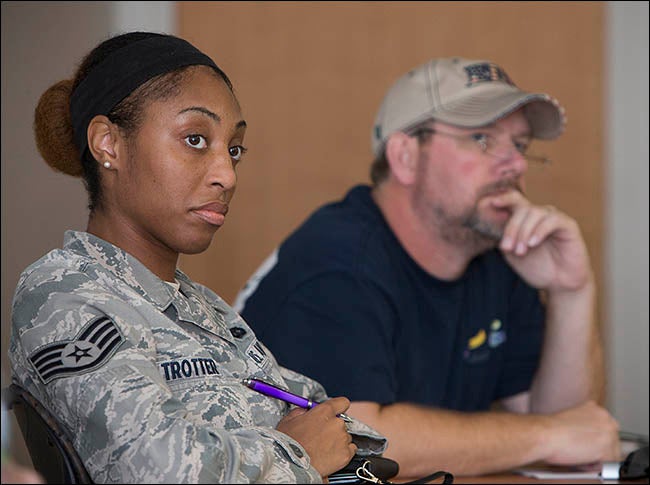EXPANDING SUPPORT
ECU Green Zone training helps faculty, staff support military population
A growing program at East Carolina University is giving faculty and staff a way to support student veterans and military service members on campus.
The initiative, Green Zone Training, gives people without military experience a glimpse into the lives of veterans and ways to help them succeed academically, adjust to the campus environment and transition to civilian employment.
“It’s important for faculty and staff to know how to respond effectively,” said Nicole Jablonski, a U.S. Navy veteran and director of ECU’s Student Veteran Services, which leads the Green Zone initiative.
 A focus of the two-hour training is a student panel of veterans who answer questions and share their views on a range of issues from deployment to transitioning from the military to ECU.
A focus of the two-hour training is a student panel of veterans who answer questions and share their views on a range of issues from deployment to transitioning from the military to ECU.
“When you go to boot camp, the goal is to break you down as a civilian and rebuild you as a military member,” Jablonski said. “It’s designed to change you as a person. It changes your mindset.”
Military service members are team- and mission-driven, accustomed to accomplishing tasks in a highly structured environment. Fellow service men and women become family, according to Jablonski. After service, veterans – especially college students – are faced with many more decisions and can feel isolated.
“You no longer have a mission. It can be really alienating,” Jablonski said. “You’re faced with a whole new world and surrounded by a brand new culture. It’s like moving to a foreign country.”
Yet student veterans have a rich life experience that faculty want to capture in the classroom to share with other students.
Dr. Anna Froula, associate professor of film studies and faculty advisor for the student-led Pirate Veterans Organization, completed Green Zone training in September.
Her research in representations of service personnel in film and popular culture helped pique her interest in the training. “I believe civilians have a duty to understand as best we can the experiences of wars fought in our name,” Froula said. “It was particularly helpful to hear the student veterans speak for themselves, and the video of what it is like to drive in Iraq has stuck with me.”
ECU has an estimated 1,100 veterans enrolled and about 1,200 students are using the GI bill (some are dependents of military service members).
“We hope that having the Green Zone Training will ensure that ECU is as military friendly as possible,” Jablonski said.
ECU faculty and staff who complete the training receive a Green Zone sticker to signify that their office is a “safe place” and they are knowledgeable about issues faced by student veterans.
“If more people can take this class and learn, it would be great,” said Ashley Bonner, a U.S. Air Force veteran who served on the student veteran panel at a recent Green Zone training. Bonner was a medic who enrolled full time at ECU in January.
Participants are reminded to be a respectful but not intrusive when asking about military service. Some appropriate first questions could be ‘Why did you join? What did you do in the service? Did you deploy?’ “They let the veteran be the one to reveal to you what they feel comfortable with,” Jablonski said. “Don’t probe. Some people don’t want to talk about it.”
About 300 people have taken Green Zone training. The next session will be held at 1 p.m. Nov. 18 in Mendenhall Student Center, Room 221. Go to the ECU Student Veteran Services website for more information athttp://www.ecu.edu/cs-studentaffairs/studenttransitions/studentveterans/faculty_training.cfm.
